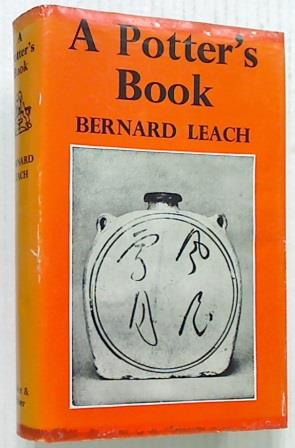|
Excerpts
from 'A Potter's Book'
Bernard Leach. Probably the most influential book on studio pottery,
first published May, 1940.
On industrialisation: Factories have
practically driven folk-art out of England; it only survives in out of
the way corners even in Europe, and the artist-craftsman, since the day
of William Morris, has been the chief means of defence against the
materialism of industry and its insensibility to beauty.
On mass-production: In the work of the potter-artist…there is a unity
of design and execution…that has no counterpart in the work of the
designer for mass-production.
On bad taste: In the field of ceramics the responsibility for the
all-pervading bad taste of the last century…lies mainly with machine
production and the accompanying indifference to aesthetic considerations
of individual industrialists…We meet everywhere with bad forms and
banal, debased, pretentious decoration and tawdriness of form that must
be seen to be believed.
 On
intuition: The art of the craftsman….is intuitive and humanistic…that
of the designer rational, abstract and tectonic… On
intuition: The art of the craftsman….is intuitive and humanistic…that
of the designer rational, abstract and tectonic…
On tradition: A potters traditions are part of a nation’s cultural
inheritance and in our time we are faced with the breakdown of the
Christian inspiration in art. We live in dire need of a unifying culture
out of which fresh traditions can grow. The potter’s problem is at root
the universal problem and it is difficult to see how any solution aiming
at less than the full interplay of East and West can provide either
humanity, or the individual potter, with a sound foundation for a
world-wide culture….
On democracy: Liberal democracy which served as a basis for the
development of industrialism, provides us to-day with a vague humanism
as insufficient to inspire art…
On students: The problem is that the people who are attracted by the
hand crafts are no longer the simple-minded peasantry, who from
generation to generation worked on in the protective unconsciousness of
tradition, but mainly self-conscious art students.
On the pseudo-medieval: The reaction started by William
Morris.....culminated in what I have called the individual craftsman....
Beginning in protest against the irresponsible use of power, it came to
an end in pseudo-medieval crafts little related to national work and
life. Thence has arisen an affirmation of the mechanical age in art –
functionalism (Le Corbusier, Picasso and the Bauhaus)....which tends to
an over-intellectual effort to discover norms of orderliness and
utility.
On Japan: I have had two extremes of culture to draw upon and it was
this which caused me to return to Japan where the synthesis of East and
West has gone furthest
On vitality: One may throw fifty pots in an hour, on the same model,
which only vary in fractions of an inch, and yet only half a dozen of
them may possess that right relation of parts which gives vitality -
life flowing for a few moments perfectly through the hands of the
potter.
On decoration: not only must the pattern be good in itself and freely
executed, but it must combine with and improve the form and harmonise
the with the natural variations of both colour and texture of body and
glaze
On imperfections: The Far Eastern point of view is that all these
qualities can be used and that they are incidental to nature rather than
accidental to man
on teaching: I often see electric kilns and power wheels installed in
schools, and clay, pigments and glazes bought ready made. This is
beginning at the end, and is a loss of opportunity and a waste of
money...Children....enjoy finding and digging their own clay, building
their own kilns and making their own colours and glazes as potters used
to do before the machine age
|

 On
intuition: The art of the craftsman….is intuitive and humanistic…that
of the designer rational, abstract and tectonic…
On
intuition: The art of the craftsman….is intuitive and humanistic…that
of the designer rational, abstract and tectonic…